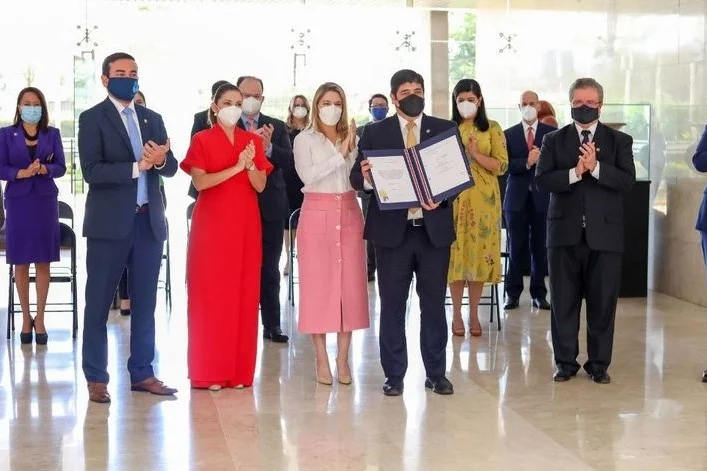Costa Rica’s OECD Membership Strengthens Productive Sustainability Based on People – Planet – and Prosperity

Costa Rican President Carlos Alvarado signed the law approving Costa Rica’s OECD Accession Agreement and the OECD Convention.
This signing signals Costa Rica’s imminent entry as the 38th member of the group that represents 80% of the world’s gross domestic product.
Costa Rican President Carlos Alvarado signed last Friday a law approved by Congress which recognizes Costa Rica’s OECD Accession Agreement and the OECD Convention.
That is a key milestone for the country’s integration as the 38th member of the Organisation for Economic Co-operation and Development (OECD) that was founded and, in May 2020, invited Costa Rica to join the group.
Although a few more steps are needed to become an official member, Costa Rica celebrates the presidential signing as the successful outcome of a series of evaluations by 22 OECD committees. With its membership, Costa Rica will be part of a group that conglomerates 80% of the world’s gross domestic product (GDP) and 60% of international trade.
One of the sectors that unquestionably benefits from this is foreign direct investment (FDI), an effort led the Costa Rican Investment Promotion Agency – CINDE. According to CINDE, this membership will strengthen and benefit the 3Ps of the country’s value proposition: people, planet, and prosperity.
People. Why do companies continue to grow and invest in Costa Rica? Among the many reasons, Costa Rica’s human talent leads the response. Not by chance, the World Economic Forum ranked Costa Rica number one in human capital in Latin America, as well as in digital skills of its population.
The Costa Rican DNA is highly valued in the labor market, a result of the efforts of the country’s educational system, which was analyzed in depth by the OECD.
The OECD Reviews of National Policies for Education: Education in Costa Rica, highlighted that education has been “an engine for the country’s development and has been crucial in building one of the most stable democracies, most skilled-based labor markets, and highest levels of well-being in Latin America.”
The review considers that Costa Rica is at a turning point in its promoting of development, so its OECD membership will reinforce a key country goal: educate more Costa Rican human talent in line with the needs of the knowledge economy.
With this, the country can continue to generate ever-more knowledge intensive processes, as it has done in the services sector, in which Costa Rican exports double the average of OECD member countries.
Planet. Costa Rica is renowned not only for being one of the oldest democracies in Latin America, but also for its beaches, flora, and fauna, as it hosts 6% of the world’s biodiversity.
Joining the OECD will reinforce the country’s goal of sustainability. Costa Rica has aimed to become a carbon-neutral nation by 2050, and as of today, 99% of its electricity generation comes from renewables: water, wind, geothermal, biomass, and solar energies.
Sustainability is one of the key principles of the OECD, which ascertains that the idea is to “use economic development to promote a fairer society while respecting ecosystems and natural resources.”
Costa Rica agrees that these standards should also be reflected in investments with a real purpose. According to CINDE’s managing director, Jorge Sequeira, “Costa Rica believes in FDI that can grow efficiently, providing investors with the ideal conditions for sustainable growth, thereby adding value to companies, the citizenry, and the planet.”
Prosperity. Costa Rica is looking for more improvement in public-private ventures, public policies, and business climate to strengthen its integration in the knowledge economy and global supply chains. Through the evaluation committees, the country’s rule of law was measured; the review showed that companies investing in Costa Rica will have both legal certainty and institutionality on their side.
The country’s free trade zone regime was also studied, an instrument that provides highly competitive incentives for investment.
The OECD ratified that the system of incentives for foreign investment fully meets the applicable international standards and criteria for international oversight and transparency.
“The OECD’s invitation to Costa Rica safeguards the soundness of the free trade zone regime for FDI and projects its seal of excellence, already internationally recognized, so that all investors have the certainty that, when investing in Costa Rica, the incentives granted under these standards are fully in line with the highest international best practices and requirements,” explained CINDE’s managing director.
Over its 60 years of existence, the OECD has taken part in almost all policy spheres through its standards, which are based on evidence, statistics, and reliable reviews. With this new step, Costa Rica will adhere to these best practices, becoming the fourth Latin American country to join this prestigious organization.
 Albania
Albania Algeria
Algeria Andorra
Andorra Argentina
Argentina Armenia
Armenia Australia
Australia Austria
Austria Azerbaijan
Azerbaijan Bahrain
Bahrain Belgium
Belgium Bolivia
Bolivia Brazil
Brazil Bulgaria
Bulgaria Cambodia
Cambodia Cameroon
Cameroon Canada
Canada Chad
Chad Chile
Chile China
China Colombia
Colombia Costa Rica
Costa Rica Croatia
Croatia Cyprus
Cyprus Czechia
Czechia Denmark
Denmark Ecuador
Ecuador Egypt
Egypt Finland
Finland France
France Georgia
Georgia Germany
Germany Ghana
Ghana Greece
Greece Hungary
Hungary Iceland
Iceland India
India Indonesia
Indonesia Ireland
Ireland Italy
Italy Jamaica
Jamaica Japan
Japan Jordan
Jordan Kazakhstan
Kazakhstan Kenya
Kenya Kuwait
Kuwait Latvia
Latvia Lebanon
Lebanon Libya
Libya Lithuania
Lithuania Luxembourg
Luxembourg Malaysia
Malaysia Maldives
Maldives Mali
Mali Malta
Malta Mexico
Mexico Moldova
Moldova Monaco
Monaco Morocco
Morocco Netherlands
Netherlands New Zealand
New Zealand Nigeria
Nigeria North Macedonia
North Macedonia Norway
Norway Oman
Oman




